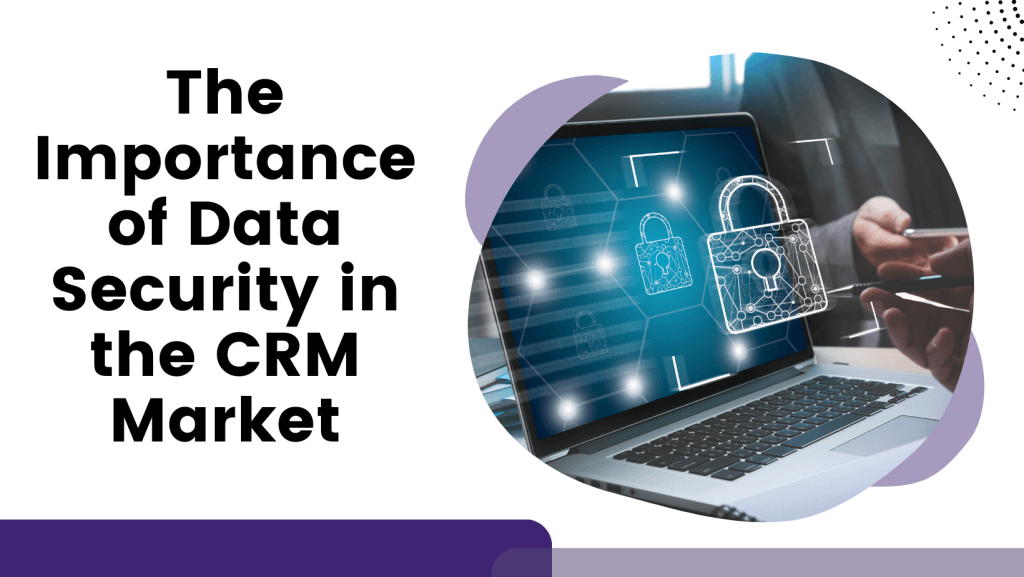
Customer relationship management (CRM) solutions are crucial for business success in today’s data-driven economy. However, data security needs to be more frequently addressed despite CRM’s numerous benefits.
Protecting sensitive data such as customer records, sales figures, and confidential research is only possible with data security measures. As businesses accumulate and use more customer information, its protection becomes even more important. In this article, we discuss data security in the CRM industry, hazards, and preventative measures.
What Are the Challenges of CRM Data Security
The challenges of CRM data security are apparent in the persistent threat of unauthorized access. Cybercriminals are continuously developing new techniques to circumvent security measures and steal sensitive consumer information, highlighting the challenges of CRM.
Data security may be jeopardized by various hazards, including insider threats and unauthorized access by CRM system users, emphasizing the challenges organizations face in safeguarding customer data.
Moreover, effectively incorporating a variety of either simple CRM applications or other easy-to-use software solutions offers organizations the chance to elevate their operations. Meticulous design and skillful implementation further guarantee strong data security.
Embracing third-party CRM vendors can also lead to valuable collaborations, adding to the overall beneficial challenges of CRM data protection.
Organizations must upgrade their CRM systems to meet evolving data protection requirements. These issues must be addressed to protect client data and CRM trust.
The Impact of Data Breaches in CRM
CRM data exposure can be detrimental to organizations and clients. Data breaches make client information susceptible to identity theft, financial fraud, and other offenses. This undermines client confidence in the company. Data intrusions have a financial and legal impact on companies. Noncompliance with data protection regulations such as the GDPR and CCPA can result in hefty penalties. Additionally, organizations may confront costly litigation from breached clients seeking compensation.
Data intrusions can harm a company’s brand image and client relationships for years. Data breaches can harm consumer loyalty and confidence. Data breaches can harm a company’s reputation, decreasing consumer acquisition and retention. Rebuilding trust after a data breach is challenging and requires transparency, communication, and robust security measures.
The Need for Robust Data Security Measures in CRM
CRM systems require robust data security for a variety of reasons, including:
First, CRM solutions store consumers’ personal, financial, and communication information. Hackers and fraudsters target this vital information for identity theft, fraud, and account access. Strong data security procedures allow businesses to reduce data breaches and protect client confidentiality.
Second, regulatory compliance requirements strengthen the security of CRM data. Under the GDPR and CCPA, organizations must secure personally identifiable information. Failure to comply with these regulations may result in severe penalties, legal obligations, and brand damage. Businesses can comply with these standards by emphasizing CRM data security and reducing risk exposure.
Strategies for Enhancing Data Security in CRM
Data security strategies are crucial for protecting sensitive client data in CRM systems.
- Unauthorized parties cannot decipher data at rest and in transit. Access to the CRM system is restricted using role-based permissions and multi-factor authentication to safeguard client data. Data backups and disaster recovery plans should be created regularly to reduce data loss and system failure.
- Training and awareness among personnel enhance data security. Employees should be instructed in data security best practices, such as password administration, customer data handling, and social engineering phishing attacks. By educating and equipping employees to protect client data, businesses can foster a security-aware culture and reduce internal data intrusions. CRM systems must be routinely monitored and audited to identify flaws and suspicious behavior. Proactive monitoring aids in the detection and mitigation of security incidents.
The Role of Technology in Data Security for CRM

With advanced technology, CRM solutions secure sensitive customer data. CRM data must be encrypted during transmission and storage. Encryption renders information unintelligible and ineffective if intercepted or accessed by unauthorized parties. Modern encryption mechanisms prevent data breaches and unauthorized access.
Multi-factor authentication makes CRM platforms more secure. MFA requires users to verify their identities using passwords, security credentials, or biometric information. It is more difficult for attackers to circumvent these additional authentication procedures, reducing the risk of unauthorized access. Monitoring and defending CRM systems against unauthorized access, malware, and other security threats are also performed by intrusion detection and prevention systems (IDPS), firewalls, and anti-virus software.
AI and ML have also altered the security of CRM data. AI and ML systems can use vast amounts of data to identify anomalies, security breaches, and suspicious activity. Using AI and ML, CRM systems can quickly detect and respond to security issues, decreasing data breaches and enhancing security. Threat intelligence tools powered by AI also monitor for new threats and vulnerabilities, enabling businesses to avoid security issues.
Best Practices for Data Security in CRM
CRM applications must adhere to data security best practices to safeguard sensitive customer information and maintain client confidence.
- Regular security assessments are indispensable. These analyses identify CRM system vulnerabilities, security holes, and deficiencies. Businesses can avoid data security risks by routinely evaluating and assessing CRM system security.
- CRM data security requires strong, distinctive passwords. The complexity of a password should consist of uppercase and lowercase letters, numbers, and special characters. Password expiration policies and education on good password hygiene can also enhance data security.
- Limiting user permissions is an additional essential best practice. Not all CRM users need comprehensive data. Role-based access controls enable organizations to restrict user access to data and functions based on employee roles and responsibilities. This prevents unauthorized access and security breaches. User permissions should be frequently reviewed and updated based on changing positions or staff turnover to maintain secure access.
The Future of Data Security in CRM
The security of CRM data will evolve as technologies and cyber threats evolve. Initially, CRM data security integrates AI and ML. AI and machine learning systems can scan vast datasets, identify trends, and detect security intrusions in real-time. This enhances security, the detection of threats, and response time. Security systems powered by AI can adapt and learn from evolving threats, enabling them to prevent and mitigate data breaches.
Second, as the Internet of Things (IoT) and interconnected devices proliferate, CRM data security must address data sharing and integration issues. Connectivity between CRM applications and numerous IoT devices and platforms increases the attack surface and necessitates stringent security measures to protect consumer data. IoT-enabled CRM solutions must incorporate secure protocols, robust authentication, and data encryption to protect sensitive data.
Blockchain technology could enhance the security of CRM data. The immutable, decentralized nature of blockchain enhances transparency, data integrity, and transactional security. Using blockchain, CRM systems can protect customer data, prevent data tampering, and increase customer confidence in data security and privacy.
Conclusion
The CRM industry is changing rapidly; thus, data protection measures must also change. Staying alert and proactive in developing strong security measures is essential as technology evolves, and cyber threats become more complex. To keep your business and customers safe from harm, you must regularly review and update your data security strategy.
Ultimately, spending money on data protection is money well spent on your company’s future. Your dedication to customer privacy and trust will shine through, and your company’s ability to adapt and thrive in the data economy will be strengthened by your actions.
FAQs
How does compliance impact the security of CRM data?
CRM requires compliance with the GDPR and CCPA. These requirements aid businesses in avoiding costly penalties, demonstrating their commitment to customer privacy, and gaining the trust of customers increasingly concerned about data protection.
How can businesses maximize CRM benefits while maintaining data security?
Integrating security measures into CRM strategies enables organizations to prioritize data security. This includes selecting a secure system, upgrading and patching CRM software, educating employees on data security, and conducting regular security audits.
Is data security a one-time effort, or does it require ongoing attention?
Security of data is ongoing. Since cyber threats and vulnerabilities evolve, businesses must regularly evaluate and upgrade their data security. Data security requires regular training, monitoring, and awareness of security trends.